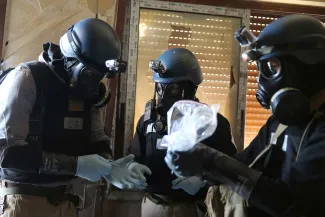A Red Line in Syria in 2013

Overview
In 2013, reports emerged that Syria’s President Bashar al-Assad had deployed chemical gas as a weapon in Ghouta, Syria, during the country’s ongoing civil war. Months prior, U.S. President Barack Obama had referred to this type of attack as a “red line” that, if crossed, would move the United States to act militarily. The United States now had a choice: whether to uphold its word and respond with military action at the risk of escalating a violent conflict.
Students will learn about the limitations of intervention strategies during cases of humanitarian crisis and about the potential benefits and drawbacks of military approaches.
The Situation
In March of 2011, civil unrest against the Syrian government of Bashar al-Assad broke out. The ongoing conflict has since broken out into a civil war, leading to more than 350,000 deaths. This ongoing conflict has also caused more than half of Syria’s population to flee their homes, prompting the world’s largest refugee crisis in decades.
In 2012, President Obama was asked whether he could envision using military force in Syria. He responded that “a red line for us is we start seeing a whole bunch of chemical weapons moving around or being utilized. That would change my calculus.” The United States was reluctant to involve itself in another foreign military conflict, especially after nearly ten years of fighting in Afghanistan and Iraq. At the same time, the United States wanted to communicate to Syria that violating international law and using illegal weapons and using illegal weapons would not be tolerated. The United States also had concerns that Syria’s chemical weapons could spread deadly gas into the arsenals of others including terrorist groups.
The following year, on August 21, 2013, reports emerged that the Assad regime had used a chemical gas called sarin as a weapon against Syrian civilians. Although the United States and many other countries had condemned these actions on civilians, such efforts had not stopped the Assad regime from waging chemical warfare.
The United States was faced with a decision: whether it should fulfill its word and respond to the deployment of chemical weapons with a military strike or continue to rely on diplomatic solutions. By responding militarily, the United States would uphold its word and credibility while potentially preventing future attacks. However, any action drawing on military forces would involve the United States in a distant conflict, with no clear route to victory and at great risk to American lives and resources.
Decision Point
Set in late August 2013
Reports have confirmed that the Syrian government has deployed chemical weapons against Syrians in Ghouta. The president has called a meeting of the National Security Council (NSC) to discuss how the United States should respond, considering U.S. credibility, national security, and humanitarian concerns.
National Security Council members should choose between the following options:
- Respond with military action right away. This option would strengthen U.S. credibility, demonstrating that crossing a red line based on humanitarian principles will not be tolerated. At the same time, military action would involve the United States in a risky and dangerous foreign conflict. This comes at a time when its resources are depleted and public support for such action has diminished in the context of its longstanding engagement in Afghanistan and Iraq.
- Delay action and bring other countries into a coalition to leverage a multilateral response. This option would ensure the United States would not be alone in responding and would strengthen international legitimacy for any action, including military action, by building on multiple countries’ military resources and credibility. The process would likely be difficult and time-consuming, however, potentially rendering such a response ineffective.
- Hold back, avoiding military conflict at all costs while seeking a diplomatic resolution. Given the costs and risks associated with military action, a military strike would carry enormous risks. Avoiding military action and instead seeking purely diplomatic solutions could ensure the United States does not become entangled in the conflict. Holding back could, however, harm U.S. credibility and fail to effectively address the humanitarian disaster.
Photo: A U.N. chemical weapons expert holds a plastic bag containing samples from one of the sites of an alleged chemical weapons attack in Damascus, Syria on August 29, 2013.
Source: Mohamed Abdullah/Reuters
Additional Resources
- Obama’s Red Line, Revisited Politico
- The Syria Red Line, Three Years Later Council on Foreign Relations / Pressure Points
- Book: Red Line by Joby Warrick Penguin Random House
Need inspiration for how to structure your Mini Simulation?
More Mini Simulations


